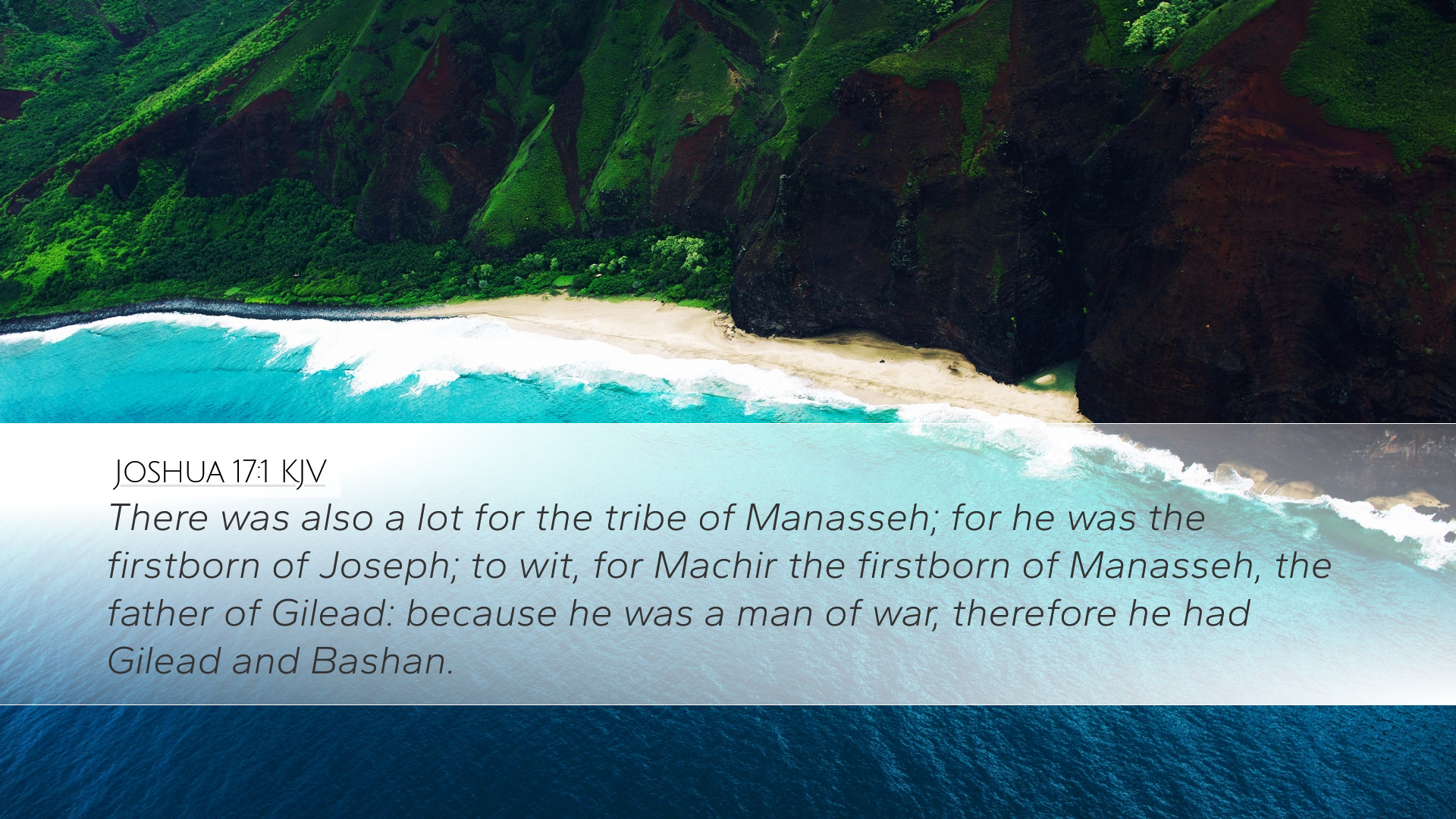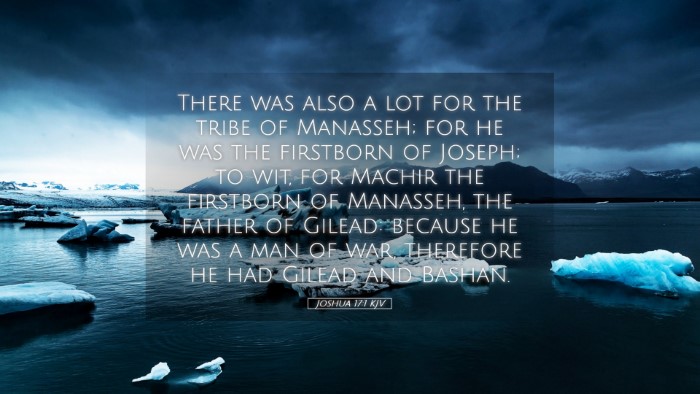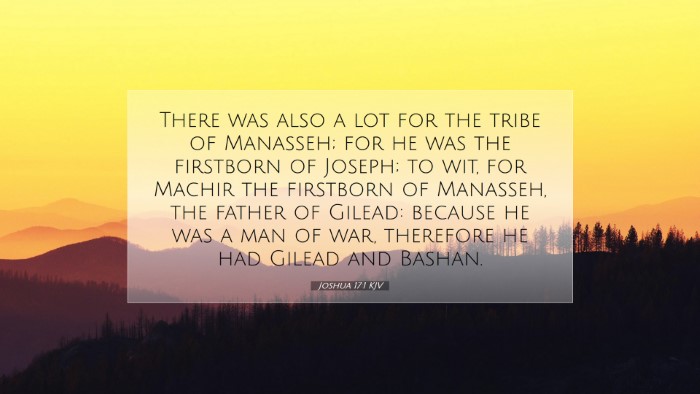Old Testament
Genesis Exodus Leviticus Numbers Deuteronomy Joshua Judges Ruth 1 Samuel 2 Samuel 1 Kings 2 Kings 1 Chronicles 2 Chronicles Ezra Nehemiah Esther Job Psalms Proverbs Ecclesiastes Song of Solomon Isaiah Jeremiah Lamentations Ezekiel Daniel Hosea Joel Amos Obadiah Jonah Micah Nahum Habakkuk Zephaniah Haggai Zechariah MalachiJoshua 17:1
Joshua 17:1 KJV
There was also a lot for the tribe of Manasseh; for he was the firstborn of Joseph; to wit, for Machir the firstborn of Manasseh, the father of Gilead: because he was a man of war, therefore he had Gilead and Bashan.
Joshua 17:1 Bible Commentary
Bible Commentary on Joshua 17:1
Joshua 17:1 reads: "There was also a lot for the tribe of Manasseh; for he was the firstborn of Joseph; to wit, for Machir the firstborn of Manasseh, the father of Gilead: because he was a man of war, therefore he had Gilead and the region of Bashan."
Introduction
This verse introduces the allocation of land to the tribe of Manasseh, which was divided into two sections: one for the Machirites and another for the rest of the tribe. The significance of this allocation can be understood through the historical lineage of Manasseh as well as the particular characteristics of the land granted to him. Commentaries from Matthew Henry, Albert Barnes, and Adam Clarke provide profound insights into these aspects.
Contextual Background
Joshua, as the successor to Moses, is performing the crucial role of distributing the Promised Land among the tribes of Israel. The tribe of Manasseh being mentioned first highlights its importance due to its connection with the lineage of Joseph, one of the patriarchs of Israel. This land grant is significant not just for historical reasons but also due to the spiritual implications it holds for the tribes of Israel.
Insights from Commentaries
Matthew Henry's Commentary
Matthew Henry emphasizes the legacy of Manasseh as Joseph’s firstborn, which grants him a significant place in the tribe's inheritance. He notes that God’s providence is evident in giving the firstborn a double portion. The allocation to Machir, the firstborn of Manasseh, is significant as it reflects God’s justice and order in the division of the land.
- Machir's Legacy: Machir's valor as a warrior is recognized, indicating that inheritance can be associated with one's achievements and merits.
- The Significance of Gilead: The land of Gilead, characterized by its rich pastures and resources, is recognized as a place of strength for the tribe. It serves both agricultural and defensive purposes.
- Spiritual Implications: Henry indicates that the tribe should remain steadfast in faith as God apportions their inheritance, reminding the faithful that earthly inheritances also carry spiritual weight.
Albert Barnes' Notes
Albert Barnes dives deeper into the historical occupations and the military prowess attributed to the family of Machir. He draws attention to the distinct character traits celebrated by God, such as valor and leadership, which are often rewarded in the biblical narrative.
- Divine Favor: Barnes highlights that Gilead's allocation was not just seen as a geographical grant but as a divine favor activated by Machir's endeavors as a military leader.
- The Duality of Inheritance: The split inheritance reflects the dual nature of Manasseh, showcasing both strength (through Machir) and the unity expected from the larger tribe.
- Encouragement for Leaders: Barnes encourages modern leaders to recognize their responsibilities in guiding their people spiritually, drawing a parallel to Machir's role as a patriarch.
Adam Clarke's Commentary
Adam Clarke expands on the geographical implications of the land distribution. He emphasizes that the territory of Manasseh included not just fertile lands but also regions that required strength to occupy and defend.
- The Character of the Lands: Clarke notes that the lands designated were not just given due to ancestry but were reflective of the strengths required by the tribe, suggesting a divine alignment of need and provision.
- Cultural and Military Responsibilities: The mention of Machir’s role as a “man of war” suggests the cultural responsibility placed upon the tribe to maintain the integrity of their promises and defend their provisions.
- Lessons in Inheritance: Clarke highlights the broader theological lesson that believers are called to recognize their "inheritance" in Christ, drawing a parallel to the spiritual resources available to the community of faith.
Theological Reflections
In reviewing the combined insights of these esteemed commentaries, we see the dual themes of divine providence and community responsibility. The story of Manasseh serves as a reminder to pastors and students of scripture that each inheritance carries a burden of stewardship.
- Stewardship: Just as Gilead's inheritance required the Manasseh warriors to protect it, the modern church must protect and steward its spiritual inheritance.
- Courage in Leadership: Emulating Machir's bravery, leaders in faith must arise to tackle the challenges their communities face today.
- God's Providence in Placement: Understanding God's providence in assigning heritage reveals deeper truths about spiritual blessings and challenges in today’s context, teaching that responsibilities come with blessings.
Conclusion
Joshua 17:1 encapsulates significant themes relevant not just in its ancient context but also for present-day application. The contributions from Matthew Henry, Albert Barnes, and Adam Clarke provide a rich theological and historical framework, encouraging deeper reflection and action among pastors, students, scholars, and believers alike. Recognizing the inheritance outlined in scripture ultimately leads to a greater understanding of our role in the Kingdom of God, urging us toward faithfulness, stewardship, and courageous leadership.


